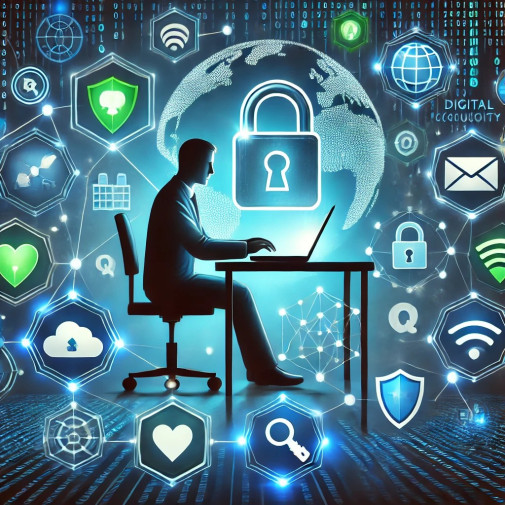

In today's interconnected world, the digital realm has become an integral part of our lives. From online shopping and social media to remote work and cloud storage, our reliance on technology is undeniable. However, this dependence comes with its own set of risks. Cyber threats like phishing, hacking, and identity theft are on the rise, making cybersecurity and digital literacy essential skills for everyone. This guide will help you understand the basics of navigating the digital world safely and responsibly.
Cybersecurity refers to the practice of protecting systems, networks, and data from cyberattacks. It involves various tools, technologies, and best practices designed to safeguard information from unauthorized access, theft, or damage.
Malware: Malicious software like viruses, worms, and spyware.
Ransomware: A type of malware that locks your files and demands payment for their release.
Phishing: Fraudulent attempts to steal sensitive information through fake emails or websites.
Data Breaches: Unauthorized access to confidential data.
DDoS Attacks: Overloading a system to disrupt its functionality.
Protects sensitive personal and financial information.
Ensures business continuity by safeguarding systems and data.
Prevents identity theft and financial fraud.
Digital literacy is the ability to effectively and responsibly use technology for communication, information gathering, and problem-solving. It goes beyond basic computer skills to include understanding the implications of your digital actions.
Information Literacy: Knowing how to identify credible sources and avoid misinformation.
Technical Literacy: Understanding tools like antivirus software, VPNs, and firewalls.
Ethical Literacy: Recognizing the ethical implications of online behavior, such as respecting others’ privacy.
Use strong, unique passwords for all accounts.
Enable two-factor authentication (2FA) where available.
Keep your operating system, software, and antivirus updated.
Double-check URLs and email addresses before clicking on links.
Avoid sharing sensitive information through unsecured channels.
Be skeptical of "too good to be true" offers.
Regularly review privacy settings on social media and other platforms.
Limit the amount of personal information you share online.
Use a VPN, especially when using public Wi-Fi.
Stay informed about the latest cybersecurity trends and threats.
Take online courses on digital literacy and cybersecurity basics.
Follow reputable blogs and resources for updates.
Share your knowledge about online safety with friends and family.
Report phishing attempts and other cyber threats to relevant authorities.
Promote awareness campaigns in your community or workplace.
Antivirus Software: Norton, McAfee, Bitdefender.
Password Managers: LastPass, Dashlane, 1Password.
VPNs: NordVPN, ExpressVPN, Surfshark.
Cybersecurity Awareness Programs: Stay Safe Online, Cyber Aware.
Digital Literacy Platforms: Coursera, edX, LinkedIn Learning.
Blogs and Websites: Cybersecurity Ventures, Krebs on Security.
The digital world offers incredible opportunities, but it also comes with risks that require vigilance and knowledge. By adopting cybersecurity best practices and enhancing your digital literacy, you can navigate the digital realm safely and confidently. Remember, staying secure online is a shared responsibility that begins with individual actions. Take charge of your digital safety today!
For more details you can join us :
How to Join
It's not too late to be part of this exciting journey! Enroll now to catch up on the ongoing sessions and benefit from our expert-led program.
Contact Us:
📞 9805195555
📧 info@gyanpunj.com.np
Social Media
Facebook : https://www.facebook.com/gyanpunjsol/
Instagram : https://www.instagram.com/gyanpunjsol/
Youtube: https://www.youtube.com/@gyanpunj2077
You can Also Connect with us though App.
App for android: https://play.google.com/store/apps/details?id=com.app.gyanpunjlms&hl=en
Take the leap today and turn your passion for translation into a professional skill set!
THANK YOU :))

Mediation Training of Trainers (TOT) Program by Gyanpunj!Generally Conflicts are a natural part of...
View Details
The District Judge Preparation Course by Gyanpunj School of Leadership is designed for aspiring jud...
View Details
How Gyanpunj School of Leadership Helps Organizations ThriveIn every workplace, people are the driv...
View Details
Click the button below to chat with us on WhatsApp:
Chat on WhatsApp